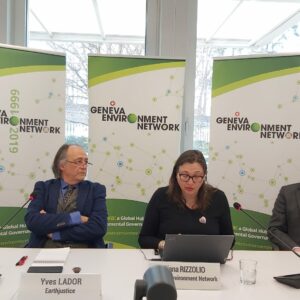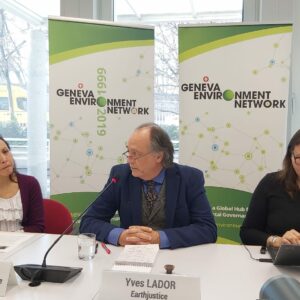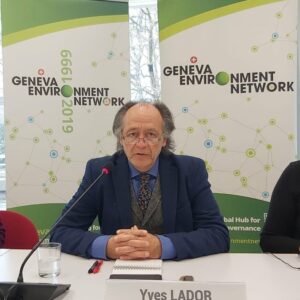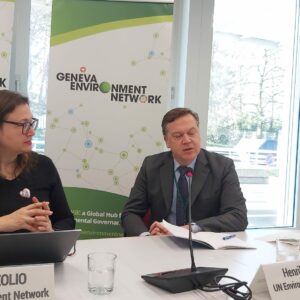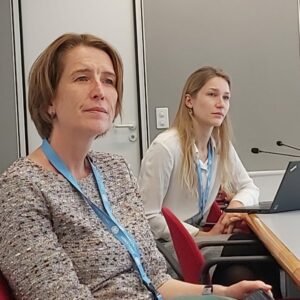Événement Conférence
Call for Release for Niloufar Bayani and her Fellow Environmental Conservationists
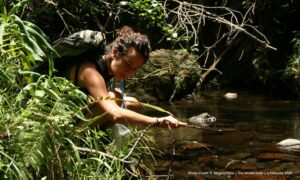
14 Feb 2023
15:00–15:45
Lieu: International Environment House I | Room 2 & Online | Webex
Organisation: Earthjustice, Geneva Environment Network
Tuesday, 24 January 2023 marked the 5th year of the detention of 8 Iranian scientists of the Persian Wildlife Heritage Foundation, including Niloufar Bayani, who worked at the UN Environment Programme in Geneva as a consultant. Human rights organizations have denounced the unacceptable conditions of the trial and of their detention. This session, co-organized with the Geneva Roadmap 40/11 for Environmental Human Rights Defenders, discussed the importance of protecting those who protect nature and why releasing Niloufar and her fellow environmental conservationists detained in Iran matters for the global environment.
About this Session
Tuesday 24 January 2023 marked the 5th year of the detention of 8 Iranian scientists of the Persian Wildlife Heritage Foundation (Miras Parsian), including Niloufar Bayani, who worked at the UN Environment Programme (UNEP) in Geneva as a consultant.
As the Iranian authorities seem to be currently pardoning or commuting the sentences of a large number of prisoners as part of an annual amnesty, pressure is growing internationally and in Iran for these 8 scientists to be included in it. It’s in this perspective that on her side, Niloufar Bayani has announced starting a sit-in within the Evin prison to be finally released.
It was in January 2018, that these scientists, specialists in biodiversity conservation, were arrested and accused of espionage on the basis of their wildlife conservation activities, including monitoring and protecting the Asian cheetah, one of the most endangered large cat species in the world. Despite the lack of evidence against their case, Niloufar spent 8 months in isolation and 1,200 hours of interrogation before being sentenced in February 2020 to ten years.
This young Iranian was bringing international expertise. She studied at McGill University in Montreal and Columbia University in New York and worked in Geneva between 2012 and 2017, as a consultant for UNEP. She had notably joined the UN teams on the ground after Hurricane Matthew hit Haiti. She had returned to Iran to serve her country and advance its biodiversity conservation.
She dared, during her trial and in letters addressed to the Iranian authorities, to denounce the torture she suffered. Held in the section reserved for female political prisoners, along with the recently released Franco-Iranian researcher Fariba Adelkhah, she has continued her environmental research and studies, giving seminars on climate change to increase awareness amongst her peers inside Evin prison on climate issues.
Human rights organizations, such as Amnesty International and Human Rights Watch, have denounced the unacceptable conditions of their detention. This session will discuss the importance of protecting those who protect nature and why releasing Niloufar and her fellow environmental conservationists detained in Iran matters for the global environment.
Speakers
By order of intervention.
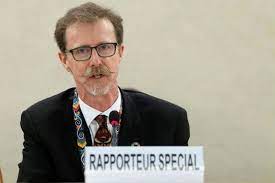
David R. BOYD
UN Special Rapporteur on human rights and the environment

Angela KARIUKI
Legal Officer, Law Division, UN Environment Programme

(Reading of Statement)
International Union for Conservation of Nature

Yves LADOR
Representative of Earthjustice to the United Nations Office in Geneva
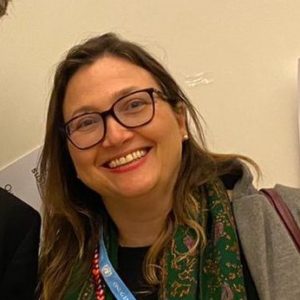
Diana RIZZOLIO
Coordinator, Geneva Environment Network | Moderator
Summary
UN Special Rapporteur on Human Rights and the Environment Statement
- More than five years ago Niloufar Bayani and seven of their colleagues were arrested in Iran. At the time, they were working for the Persian Wildlife Heritage Foundation on a project to try and save the critically endangered Asiatic cheetah.
- Niloufar was convicted and sentenced to 10 years in prison under charges of espionage. The time has come for her release.
- I join hands with my colleagues from across the United Nations and call for the immediate release of Niloufar Bayani and her colleagues so that they may rejoin their family and return to their important work.
- The world faces a triple planetary crisis and at this time we need everyone with the qualifications, experience and expertise, like Niloufar, to help protect this beautiful planet that we call home.
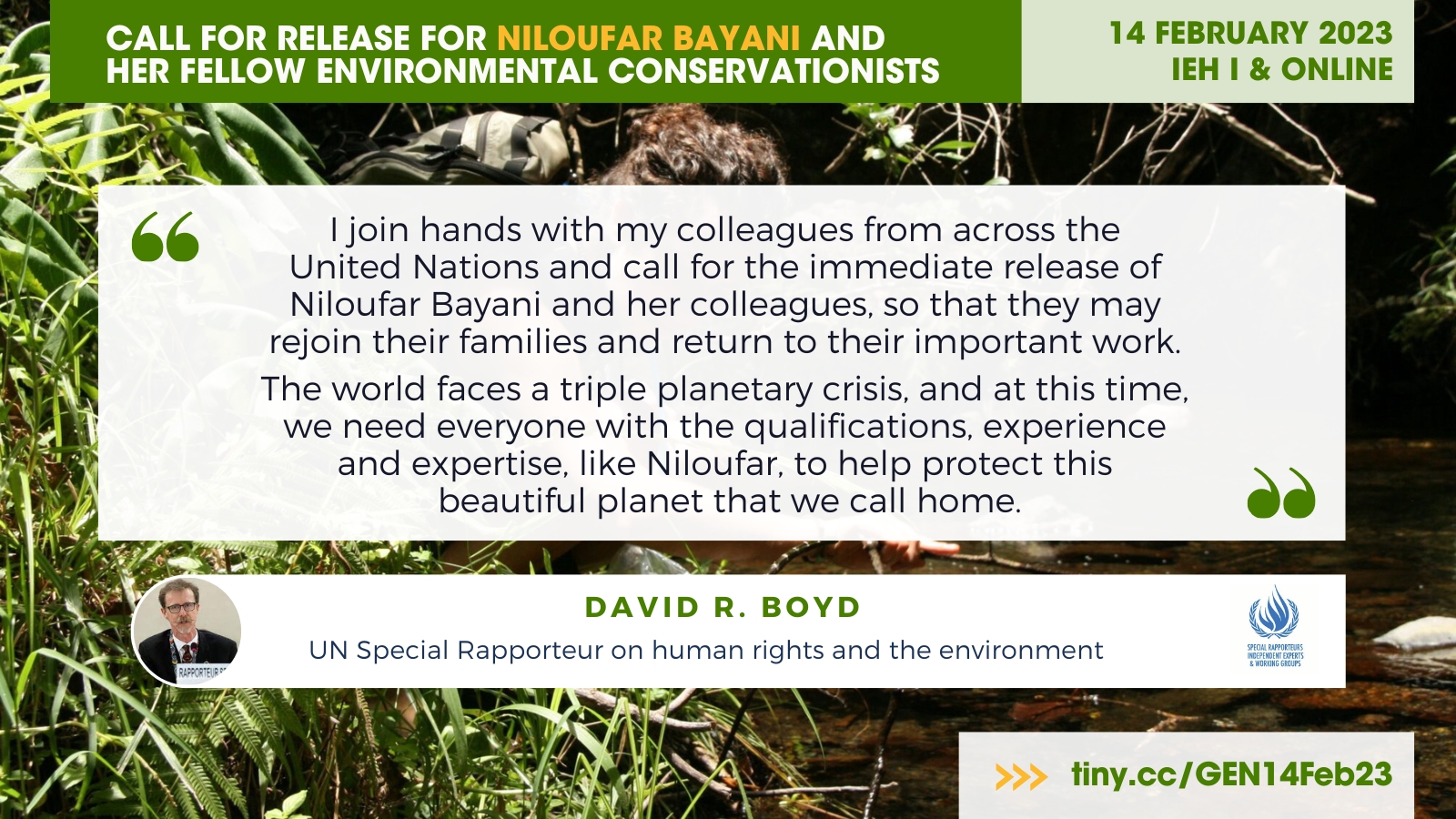
UNEP Statement
- The case of the prolonged imprisonment of Niloufar Bayani has hit very close to home for us at the United Nations Environment Programme.
- Niloufar worked with UNEP for around five years based out of our Geneva office, and colleagues who worked directly with her are participating in the room and are connected to this event today. Her work and publications on working with communities to build climate and disaster resilience demonstrated her deep commitment to environmental issues; and are well known not only within the organisation, but also outside of it.
- It was only one year after leaving UNEP and returning to her home country that she was imprisoned, along with others, while undertaking a conservation project.
- It is heartening to know that Niloufar continues her environmental research and scientific writing while in prison. It also brought a smile to many of our faces to learn that she recently established a climate seminar series aimed at increasing “climate literacy” and awareness on climate change issues in Iran.
- We learnt that she conducted a survey within her ward to understand the levels of climate awareness and understanding of its implications. The results of the survey spurred her to begin a series of climate seminars, where she has prepared briefing materials on posters and established focused groups within Evin prison to work and reflect further on the climate issue. In addition, she also published an article in the Etemad News, where she reflects on the impacts of the COVID pandemic and the importance of changing our destructive relationship with nature.
- These actions and activities are illustrative of her passion, her expertise and genuine interest in contributing viable solutions to addressing the interconnected crises facing our planet today – and she has demonstrated this even in the face of great adversity.
- Environmental conservationists all over the world are key supporters of contributing solutions to the triple planetary crises and advancing sustainable development.
- Supporting their work is important, and violence and threats against conservationists, as well as arrests and detention, are not only human rights issues, but they diminish the potential for achieving environmentally agreed goals and commitments.
- This has become even more salient since the recognition of the human right to a healthy environment.
- For UNEP, it’s clear that people need to know more about the right to a healthy environment and how to safely exercise this right; because anyone can become an environmental defender, and many do, due to circumstance rather than by design. In promoting greater protection for environmental defenders, UNEP joins others in the international community and the UN system in responding directly to the three pillars of the UN, and the UN Secretary General’s Call to Action for Human Rights.
- As many of you may know, our Executive Director, Inger Andersen, yesterday released a statement on this matter.
- In her statement, she noted that it’s already been five years since the detainment of Niloufar Bayani. Over these last five years, UNEP leadership has communicated with authorities in Tehran, in addition to submitting concerns to them in writing. Niloufar has already spent five years in prison, and we continue to be devastated that she remains imprisoned for her work on environmental conservation.
- We also take note and welcome very warmly the pardons recently issued by the Iranian authorities.
- So before closing, The United Nations Environment Programme joins many others in renewing its call for clemency and for the release of Niloufar, and indeed all the environmental conservationists imprisoned in Iran.
- In carrying out our work with environmental defenders, environmental activists and other conservationists, we are also constantly reminding ourselves that the UN was created not only to respond to the needs of Member States and to collaborate with them towards addressing environmental issues, but to protect people at the frontline of environmental conservation, even when others are unable to do so…
IUCN Statement
- Following the pardons issued recently by the Iranian authorities, the International Union for Conservation of Nature (IUCN) renews its call for the release of IUCN member conservationists imprisoned in Iran since 2018.
- The IUCN statement (IUCN renews call for release of Iran conservationists) was read during the event.
Geneva Roadmap Statement
- All human rights violation and attacks to human rights defenders in all regions need our attention. Unfortunately, today we are witnessing a worrying trend of increasing human rights violations against environmental human rights defenders. Like the case of Niloufar Bayani and her colleagues exemplifies, those working in international and intergovernmental or non-governmental organizations face the danger of being criminalised for the core of their work: protecting nature.
- If environmental human rights defenders are under threat, the work of scientists will face more and more challenges in collecting and sharing information. Independent and universally accessibile science is fundamental to meet the challenges of the triple planetary crisis. Without it, states and organizations alike would be left in the dark.
- The case of Niloufar Bayani and her colleagues is not a stand alone, it echos and it is connected to many other stories around the world that pushed the Human Rights Council to adopt Resolution 40/11 for the protection of environmental human rights defenders. Activities in the field of environment protection, like monitoring environmental trends on the field, are essential to the feed report and to spread science and information. Therefore, it is crucial that environmental human rights defenders are protected by all states. Resolution 40/11 was adopted by consensus by the Human Rights Council, which is why Earthjustice together with other NGOs, IGOs and States have developed the Geneva Roadmap 40/11 for Environmental Human Rights Defenders, to ensure the full implementation of this resolution. Today we call upon Iran to fully implement this resolution fully and for Niloufar Bayani and all of her colleagues to be released as part of the current annual amnesty turn.
- In the framework of the 52nd regular session of the HRC and in the occasion of the 25th anniversary of the declaration on human rights defenders, the situation of the environmental HRDs will be central to the discussions and this case is a perfect example of why it is important for this right to be fully implemented.
Additional comments from UNEP
- Niloufar worked with UNEP from 2012 to 2017. She went to school in Iran and then studied abroad in Canada and in the USA. In parallel to her studies she conducted research and worked as an assistant. She joined the team in Geneva in 2012 as a young enthusiastic and talented environmentalist, highly appreciated within the team. She went many times to do field work in so called ‘hardship duty stations’, where life can be very hard, but she was happy to do so. In 2017 she decided to return to Iran, to give back what she had learned to her home country’s environment. This makes it even more absurd that she ended up being arrested there.
- The current release of many prisoners by the Iranian government is a source of hope and the UNEP plea that she and her colleagues will be part of this amnesty.
- It is important for Niloufar and other defenders to feel that they are not forgotten. Writing letters to be addressed to the prison where she is represents a strong sign to authorities and to imprisoned themselves that the world remembers them and awaits their release.
Video
Live on Webex
Live in the room
Highlights
Photo Gallery
Links
- Video message from the UN Special Rapporteur on human rights and the environment David R. BOYD
- Statement from UNEP Executive Director Inger Andersen | 13 February 2023
- Call for release of Niloufar Bayani and environmental conservationists detained in Iran! | Petition on Change.org | 13 February 2023
- UNEP renews plea for release of environmental conservationist Niloufar Bayani | UNEP | 13 February 2023
- IUCN renews call for release of Iran conservationists | IUCN | 14 February 2023
- Jane’s Letter on Iranian Amnesty | Jane Goodall | 14 February 2023
- UNEP renews calls for Niloufar Bayani, 8 conservationists release from Iran | Bahle Gama | Eswatini Daily News | 14 February 2023
- Five Years Later, McGill Alum Niloufar Bayani Remains Detained in Iran | Nikki Bozinoff, Daniel Hoops, Jamie Lundine and E. Magda Price | 6 February 2023
- Environmental Human Rights Defenders | GEN Update
- Geneva Roadmap 40/11 for Environmental Human Rights Defenders
- Release of Niloufar Bayani and other environmental conservationists detained in Iran
Credit
- E. Magda Price / The McGill Daily

